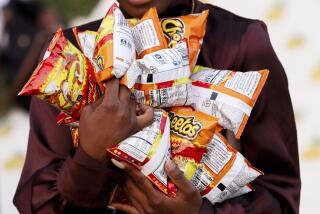New York schools’ ban on homemade goods at bake sales has parents steamed
- Share via
Homemade spinach pies are out; packaged baked potato chips are in. Mom’s pumpkin bread is out; Kellogg’s Pop-Tarts are in -- but they must be the whole-grain brown-sugar cinnamon variety.
At public school bake sales, Pop-Tarts are among 29 items the Department of Education has deemed nutritionally sound enough to sell in lieu of homemade goods, which have been banned in part because they do not list nutritional content.
Parents say the regulation, issued last month, pushes kids to eat processed food and undercuts parental efforts to teach nutrition at home by outlawing homemade goodies like organic popcorn balls and vegan cookies, which they argue are healthier than anything housed in a vending machine.
“What’s the message we’re sending here? That highly processed foods are healthier than food cooked at home,” said Elizabeth Puccini, the mother of two elementary school pupils in Manhattan.
“You’re bound to create a lifetime of bad eating habits with that,” said Puccini, who organized a “bake-in” outside City Hall on Thursday to protest the rules.
Even by New York standards, it was an unusual gathering. Scores of parents, teachers and children banged wooden spoons, whisks, sifters and pots and pans while chanting, “Read our lips, no more chips!” and waving signs reading, “Save our bake sales” and “Pure, not processed.”
Protesters set up two tables laden with goods. One featured banned items: plates of mini- empanadas, vanilla cupcakes with pale pink icing, and pumpkin bread among them. The other showed what is permitted, such as bags of low-fat Doritos, granola bars and packaged cookies.
The Department of Education says the regulations are aimed at combating obesity among the city’s more than 1.1 million public school children, about 40% of whom are overweight. By restricting bake sale offerings to goods limited in calories and wrapped in packaging that lists nutritional information, schools will help children reduce their intake of unhealthy snacks, officials say.
Among the approved items: Glenny’s Brown Rice Marshmallow Treats, baked cheddar and sour cream chips and a variety of granola bars, popcorn clusters and cookies. None has more than 200 calories or 200 milligrams of sodium per serving. The Pop-Tarts weigh in at 200 calories each.
But critics say the numbers are beside the point because the rule discourages home-baking practices that teach children to value fresh food and give people a reason to go to a bake sale, which can bring in several hundred dollars to pay for extras such as field trips and school supplies.
“Why would you go to a bake sale to buy baked potato chips?” said Mitzi Dulan, a nutritionist and registered dietitian whose clients include the Kansas City Chiefs football team and the Royals baseball team. A better plan would be to offer parents recipes for healthier snacks to sell, she said.
David Cantor, the education department’s spokesman, said the city was simply in line with a nationwide effort to combat childhood obesity, which First Lady Michelle Obama has made one of her priorities.
“We restrict sales of homemade food because we cannot monitor its nutritional value,” Cantor said, adding that “homemade is not synonymous with healthful.” A recent photo of items at a bake sale showed a sign for bacon chocolate-chip cookies, he said.
But Dulan, as well as parents and teachers, said it’s more important to look at what goes into the food. The mini-empanadas had the most ingredients, at 19, including spinach, tofu, cilantro, lime juice, and black beans. Compare that with the Pop-Tart, with 27 ingredients, including riboflavin, polydextrose and high-fructose corn syrup.
“I’d rather eat something higher in calories that doesn’t contain a bunch of chemicals I can’t pronounce,” said Stephanie Seitman, a high school English teacher.
New York isn’t the first school district to take on child weight problems, but with 1,500 public schools, it is the biggest and among the most influential in the country, and it appears to have gone further than others with the latest regulations.
Puccini, however, said school cafeterias continue to dish out sugary, processed food. “Why are we suddenly picking on bake sales as opposed to looking at the things that are available every single day?” she said, rejecting the notion that whole-grain Pop Tarts foster good health.
“In the end,” she said, “it’s still a Pop-Tart.”
More to Read
Sign up for Essential California
The most important California stories and recommendations in your inbox every morning.
You may occasionally receive promotional content from the Los Angeles Times.














